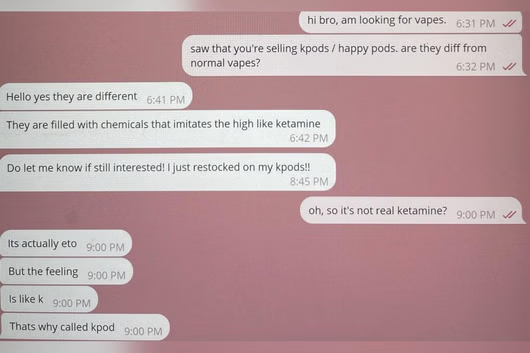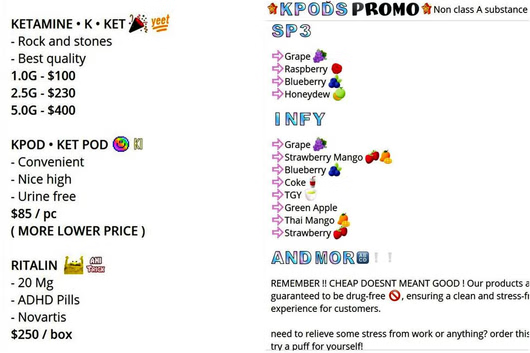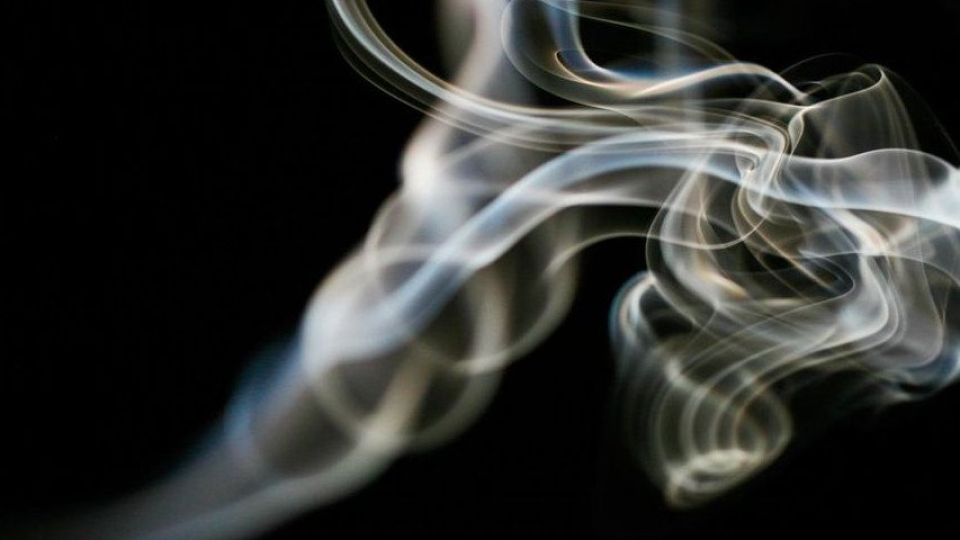December 16, 2024
SINGAPORE – Amirul (not his real name) was offered an e-vaporiser by his friend in September, and took a puff without thinking much about it.
On his friend’s urging, the 21-year-old student took another puff, and this time, his body felt heavy and his head began to spin.
While these effects lasted only a minute, he became upset upon learning from his friend that the vape had been laced with drugs.
“I was told that the vape I took was known as a Kpod,” he told The Straits Times.
Kpods – vape juice that is usually mixed with etomidate, an anaesthetic used in some non-surgical procedures – are a growing scourge in Singapore, according to some social service agencies here.
They told ST that they have seen an increase in people aged between 12 and 19 discussing and participating in this latest vape trend.
Etomidate is classified as a poison under the Poisons Act, and a licence is needed to import or sell it here.
Checks by ST showed that there were at least six groups selling Kpods on messaging app Telegram, some with hundreds of members. Some groups even offered promises to deliver the products within half an hour.
Some sellers in the Telegram groups claimed they also sell vape liquid with ketamine. Ketamine, which can be used as an anaesthetic in emergency care for pain relief or short surgical procedures, is listed as a Class A controlled drug in Singapore. It is illegal to traffic, make, import, export, possess or consume the drug.
Prices of such drug-laced vapes range from $50 to $100, according to social workers whom ST spoke to, as well as prices listed in the Telegram groups. A normal vape costs between $10 and $70.

Some sellers in the Telegram groups claimed they also sell vape liquid with ketamine. PHOTO: SCREENGRAB FROM TELEGRAM/THE STRAITS TIMES
When contacted, the Health Sciences Authority (HSA) said that it, along with the Central Narcotics Bureau (CNB), is monitoring the trend of using vapes to consume illegal substances, which has also been observed overseas.
An HSA spokesperson said that since March, it has detected a case of a vape containing ketamine and three cases of vapes containing etomidate. The case involving ketamine has been referred to CNB.
HSA said it is investigating the three suspects who were found with vapes containing etomidate. If convicted, they may be jailed, fined or both.
It is also an offence to possess, use or buy e-vaporisers, and offenders can be fined. Those who import, distribute, sell or offer to sell e-vaporisers and their components can be fined, jailed or both.
CNB said vaporisers used for controlled drugs and vaporiser pods containing controlled drugs such as cannabis have been seized by CNB and HSA officers, but added that these were “sporadic cases”.
It said it will investigate anyone with positive urine tests for controlled drugs, regardless of how the drugs are consumed.
Senior social worker Flora Tan from Care Corner, a social service agency founded in 1981, said she learnt of the trend in August from youth she worked with.
She said Kpods are marketed as a “less lethal and a more convenient alternative to drugs that promises a good kick with a few (puffs)”.
Ms Tan added that during work discussions, she and her team discovered that users as young as 12 years old are experimenting with such vapes, while those who are 18 and 19 years old are consuming them regularly.
“For a young person who is already addicted to or using vapes regularly, Kpods are the next ‘cool kid on the block’ to get acquainted with,” she added.
Mr Jedidiah Chong, a senior social worker at Fei Yue Community Services, said the charity was alerted to the Kpod trend in August, when its social workers said they had heard youth talking about it.

Content creator S. Subhraaj said etomidate-laced Kpods are touted to be safe by sellers as they supposedly cannot be detected by urine tests. PHOTO: SCREENGRAB FROM TELEGRAM/THE STRAITS TIMES
To protect those who work with youth, Fei Yue staff have been trained to assess situations and will call emergency services if there are safety concerns, he said.
Mr Narasimman Tivasiha Mani, executive director of youth mental health charity Impart, told ST that a longer-term solution to stop youth from using vapes is to address misconceptions – such as assuming that it is a safer and non-addictive alternative to smoking – and highlight the financial costs associated with the habit.
“Providing guidance on how to manage their finances effectively to support a healthier and fulfilling lifestyle is one way to free youth from being dependent on vapes,” said Mr Narasimman, adding that he has encountered three young people who said they have tried Kpods.
“Helping a young person think a lot more about the future will help him or her to build resilience against temptation and focus on long-term well-being instead of seeking instant gratification.”
Unpredictable effects, risk of accidental overdose
Some people have used TikTok and Instagram to warn others about Kpods.
One of them is content creator S. Subhraaj, 28, who said etomidate-laced Kpods are touted to be safe by sellers as they supposedly cannot be detected by urine tests.
However, he said one of his friends, who was being monitored by the authorities for drug consumption, tested positive for ketamine after consuming Kpods in September.
“This was when I realised that suppliers may also add other types of drugs and substances to vapes, and we’ll never know what they’re adding into them.”
Former drug addict Bruce Stevens Mathieu, 55, has also used Instagram to alert his followers about etomidate-laced Kpods. He said two parents have contacted him to help persuade their children to stop taking the product.
“Those consuming it become emboldened, and are even challenging their parents and the authorities about their consumption. They think the authorities cannot do anything about it,” said the anti-drug advocate and prison volunteer.
Dr David Teo, a senior consultant psychiatrist and deputy medical director at psychiatric clinic Connections MindHealth, said drug-laced vapes can pose health risks like confusion, seizures, and heart and lung diseases, as well as mental health issues such as depression, anxiety disorders, psychosis and suicide.
He added: “The person vaping is often unaware of the exact doses of drugs consumed. This can lead to unpredictable effects and accidental overdose, which may at times be fatal.”
Meanwhile, Amirul has distanced himself from his friends who smoke Kpods.
“They look like zombies – the way they talk and move after smoking Kpods,” said the tertiary-level student. “I’ve been passionate about boxing since I was a teen, and after I stopped vaping and smoking, my stamina improved greatly. I hope to keep it that way.”
How other places are dealing with Kpods
The Kpods situation in Singapore mirrors that in Taiwan and Hong Kong, where etomidate-laced vape products – termed “zombie vapes” and “space oil” – were found there.
In Taiwan, the authorities said the number of hit-and-run incidents linked to the consumption of etomidate-related vape products has been increasing. Two on-duty police officers died in 2024 while five others were injured, reported Taipei Times in October.
The same product emerged in 2023 in Hong Kong, and 132 people have been arrested for possession or sale of etomidate-laced vapes so far, up from nine people in 2023, the South China Morning Post reported on Dec 3.
To curb the problem, both Taiwan and Hong Kong have taken steps to control the sale of etomidate-laced vapes. Those convicted of possessing and trafficking these vapes can be jailed and fined.
Closer to home, vapes laced with ketamine and methamphetamine have also been detected in Malaysia and Thailand.
In May, the Bangkok Post reported that two Singaporeans were among four people arrested in Bangkok for selling vapes laced with methamphetamine and heroin.
In October, New Straits Times reported that Malaysian police had arrested three people who were allegedly involved in the sale of drug-laced vapes.
In addition, Malaysia plans to build laboratories that can detect synthetic drugs, including prohibited substances present in vapes.
Join ST’s WhatsApp Channel and get the latest news and must-reads.

